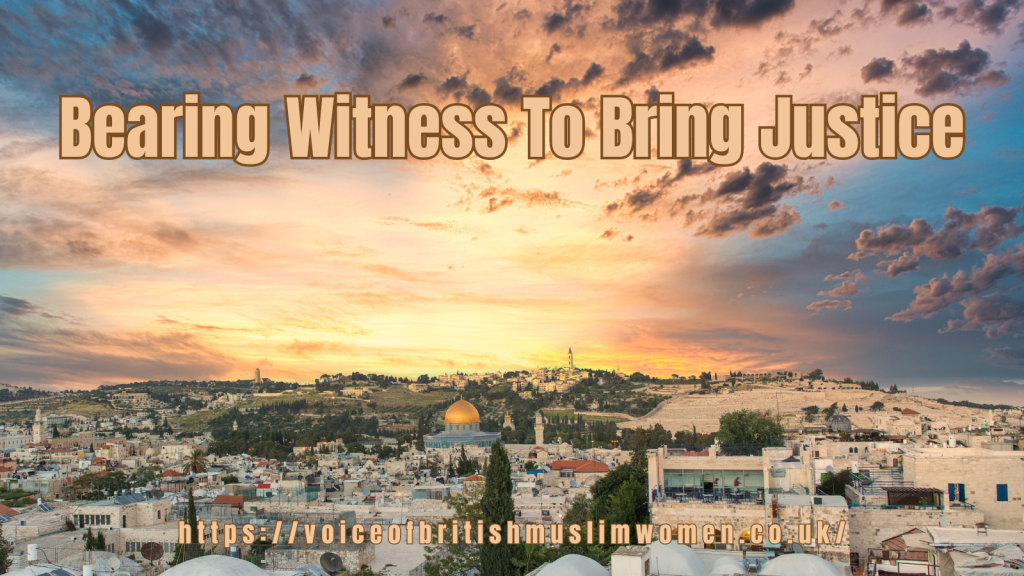
Iffat Mirza, Cambridge
If you’re like me, you’ve probably also been glued to a screen the last two weeks. Simultaneously wishing you could simply turn off your screen and hoping the violence, injustices, and horrors would stop, but also knowing that living in the safety of a London suburb, the least I can do is bear witness to the horrors of war and violence, and pray.
As headline upon headline pours in of the latest atrocity, happening in Israel and Gaza, it is becoming increasingly clear that words fail us. They fail us because we cannot ever articulate the trauma that innocent eyes are witnessing and which their bodies will bear for the rest of their lives.
However, we also fail words. We fail what language gives us. As humans, we have spent millennia perfecting the craft of language, but what is the use of all this language, all our poetry and art, our rhetoric and discourses, our words and symbols, if we cannot speak to the truth of injustices happening. This is not coming from someone who does not see the value in art and culture, far from it, in fact. However, eventually we must put our critical thinking and analytical skills to practical use. We learn in school to decipher the symbolic meanings of every minute detail of poems and novels. Now is the time to put these skills to the test. Now is the time to look at the reporting of the atrocities in Gaza, those which have been condemned by independent human rights organisations, including Amnesty International and Human Rights Watch, and consider if these reports reach us with the idea of justice at the forefront of the minds of disseminators of information.
In his Friday Sermon on 13th October, in a powerful condemnation of the killing of civilians by both Hamas and Israel, His Holiness Mirza Masroor Ahmad (may Allah be his Helper) stated:
“An ordinary person cannot even imagine the war that may now ensue as a result of the injustices that have been seen. The major powers know the intensity of the damage it will cause, yet, they are not interested in establishing justice and are unwilling to pay heed.”
War profiteering and the arms trade has wiped entire families and generations from existence. The word justice has simply become a cloak behind which leaders and influential people can hide, in order to justify what are turning out to be the gravest injustices. A humanitarian crisis is before us, and because of the language we have used, sitting in our comfortable and privileged positions, we have allowed the debate asking, ‘if there even is a humanitarian issue?’ to flourish.
His Holiness (may Allah be his Helper), the true voice of peace and justice even stated:
“Such people only care for the rule of ‘might is right’ and they simply bow to those who hold strength and power in the world. If one analyses this, it seems that major powers are bent upon inciting war, rather than ending it.”
The Holy Qur’an in most unequivocal terms teaches the importance of justice, even if one must act against themselves in order to do so:
O ye who believe! be strict in observing justice, and be witnesses for Allah, even though it be against yourselves or against parents and kindred. Whether he be rich or poor, Allah is more regardful of them both than you are. Therefore follow not low desires so that you may be able to act equitably. And if you conceal the truth or evade it, then remember that Allah is well aware of what you do.
The teachings of this verse should not be taken lightly. The wisdom behind this verse is far greater than we can comprehend, but the current events prove more than ever that where there is injustice, peace cannot thrive. Muslims are taught to place their egos and vested interests aside in order to stand for what is correct so that a superficial peace is not used simply as a cover up, but rather so that true and meaningful peace imbues every aspect of life.
A few years ago, I was taking a module as part of my degree. It was on Arabic literature, which of course is rife with references to Islamic teaching and traditions. My professor at the time, in his very academic way, said ‘Islam is a religion of testimony. Even the Shahada (the oath one recites and adheres to when entering the fold of Islam), is to bear witness:
اَشْہَدُ اَنْ لَا اِلٰہَ اِلَّا اللّٰہُ وَ حْدَہٗ لَا شَرِیْکَ لَہٗ وَ اَشْھَدُ اَنَّ مُحَمَّدًا عَبْدُہٗ وَ رَسُوْلُہٗ
“I bear witness that there is none worthy of worship except Allah. He is One and has no partner. And I bear witness that Muhammad is His Servant and Messenger.”
I had never thought about Islam through this particular lens. It was one of those moments when you hear something and you think ‘I probably already knew this but I’ve never heard it articulated so well, and therefore never saw it this way.’ This moment has since always stuck with me. And today, more than ever, it is paramount that if nothing else, we should at least bear witness to the injustices and atrocities that occur and also pray for peace and for justice. As much as we may like to, we cannot simply turn off our screens, fold our newspapers, and silence the voices.

Wonderfully expressed. I was crying as I read it . May Allah bless you and May you go on to write even more moving pieces . Ameen
LikeLike
The Islamic reference to justice is very significant to what’s happening in Gaza, without justice there will never be peace. Beautifully written.
LikeLiked by 1 person